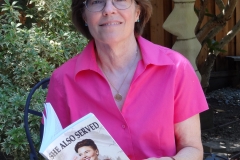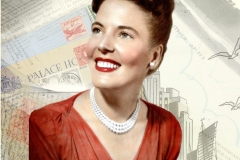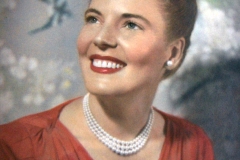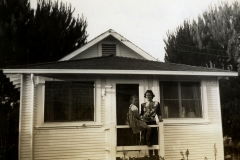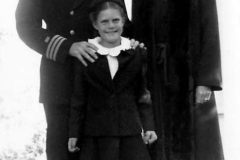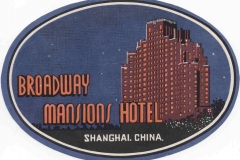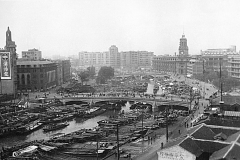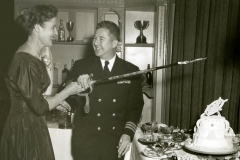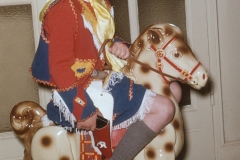PHOTOS
Click on a photo to enlarge. Use > icon on right side of photo to advance to next slide; use < icon on left side to go back.
PRESS RELEASE
Contact: janetsg@gmail.com FOR IMMEDIATE RELEASE
A Woman’s Perspective on the Greatest Generation
She Also Served: Letters from a Navy Wife, edited by Christine Witzel
High-resolution photos at shealsoserved.christinewitzel.com
During World War II, Virgilia Short Witzel, a young mother and Navy officer’s wife, grappled on the home front in Menlo Park, Calif., with wartime rationing, shortages and loneliness. During the ensuing Cold War, she experienced adventure and misadventure overseas. Living in opulence in China while surrounded by poverty, she was forced to evacuate in a rush as the Communists took over. Then in the early 1950s, she moved to London, enjoying celebrity-studded receptions, including tea at Buckingham Palace, while daughter Christine Witzel attended kindergarten and acquired an English accent and a taste for travel.
When her mother passed away at nearly 95 in 2004, Christine was overwhelmed by the boxes of letters, stashed away in the family’s Menlo Park home. “It was incredible that they had such a tidy house, given how much they had saved,” she observed.
Over the course of half-a-dozen years, she compiled the most entertaining and historically interesting selections, augmenting them with newspaper clippings, an appendix of world events and her own reflections. The result is She Also Served: Letters from a Navy Wife (now available on Kindle, free to subscribers, and for $15.26 in paperback on Amazon.)
With an eye for detail and an irrepressible sense of humor, Virgilia offers another perspective on the Greatest Generation, that of a woman who served behind the scenes. In the process of editing the collection, Christine, born in 1950, discovered a side of her mother that she had never known.
“Mother’s sense of humor and her sense of fun and energy surprised me,” says Christine, who lives with her partner in Palo Alto. “Her devotion to family did not.”
The letters also provided a window into history as it unfolded. Christine began by opening the carton labeled “Letters from China,” written from 1946 to 1948, before she was born. At the time, American officers’ families were living in luxury apartments with multiple servants, enjoying teas, parties and “obscene amounts of food,” while “millions of Chinese were displaced and starving.” Christine’s older sister, Joanna, then 12, even had her own apartment. Christine felt “incredibly guilty” learning of the Americans’ ostentation amid crippling poverty. Reading the letters, she recalled the large color photograph of a stunning woman who looked like Katharine Hepburn that hung in the hallway of the Los Altos Hills home during her teenage years. Taken in Nanking in 1948, the photo became the cover of She Also Served.
Christine admits she did not share her mother’s propensity for elegance. “As a teenager in the ’60s, I had a hard time understanding why my mother insisted on entertaining in a formal way, why being dressed properly was essential, and in addition to the usual sources of friction, the fact that she was 40 years older than me added to our different perspectives,” she comments. “What she called gracious, I called old-fashioned.”
After reading the letters, she writes, “I understand my mother so much better … and especially why my ‘tomboy vs. hostess’ adolescence was so difficult for both of us.”
However, Virgilia did not always live in the lap of luxury. Letters from the World War II home front present a strikingly different picture. While her husband, Frederick DeBoom Witzel, was stationed in the Pacific, serving on the staff of Admiral Chester Nimitz, she moved into a guest cottage behind her parents’ Menlo Park home. She planted a victory garden, rolled bandages for the Red Cross and struggled to achieve a degree of normalcy. Organizing a birthday party for 7-year-old Joanna was no easy task after Woolworth’s replaced its candy counters with book displays, her favorite bakery wouldn’t take orders and ice cream was rationed. She assured her husband that they weren’t suffering. “It’s just that the whipped cream is gone and we’re down to skim milk now.”
While the home front letters provide a picture of life in the region where Christine was born and now lives, her favorite letters are from 1953 to 1955, when she and her parents lived in London and enjoyed frequent forays to the Continent. During a trip to Paris, Virgilia describes Christine as an exemplary 5-year-old, behaving “at all times as if she’d been raised in the Stork Club.”
“I can’t believe what a dutiful, polite child I was,” Christine says, laughing.
The letters, most written to Virgilia’s mother, are filled with tidbits about daily life, festivities and voyages, but they’re quite circumspect, Christine observes. “Mother was a good Navy wife and did not discuss the details of her husband’s work.” They’re also reassuring, even when things aren’t going well. Amid Shanghai riots in late 1946, when Virgilia and U.S. officers’ families could not leave the hotel, she tells her mother to “think nothing of it.” Two years later, the Americans were swiftly evacuated, returning to San Francisco on a crowded Navy transport.
These days, Christine, who has a doctorate in sociology and is retired after 25 years in the high-tech industry of Silicon Valley, continues to write and is studying family papers and photos spanning several generations. Both of her parents, who came from old San Francisco families, never lost their taste for travel.
What lessons did Christine receive from her mother? Apart from becoming a good conversationalist as well as a gifted writer, she learned to be nervous at border crossings, to value her American passport and to be wary of drinking water from the tap in strange lands.
# # #
